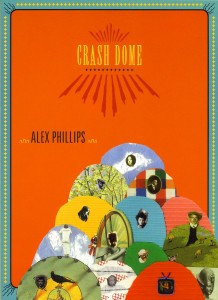 Factory Hollow Press and Alex Phillips have, for me, some specific experiential associations with the good writers of Massachusetts and the state itself, specifically the Factory Hollow Pond in Amherst. Because I don’t know anything else called Factory Hollow, I can say that these two entities alone—the collective responsible for creating Phillips’s book and the body of water in the general area where I was then poet-socialize-learning—created in me a rarely literal cognitive dissonance between language and place, seen and scene, a subject not implicit in Phillips’s debut book, but which tangentially gets built around its content, and rapidly.
Factory Hollow Press and Alex Phillips have, for me, some specific experiential associations with the good writers of Massachusetts and the state itself, specifically the Factory Hollow Pond in Amherst. Because I don’t know anything else called Factory Hollow, I can say that these two entities alone—the collective responsible for creating Phillips’s book and the body of water in the general area where I was then poet-socialize-learning—created in me a rarely literal cognitive dissonance between language and place, seen and scene, a subject not implicit in Phillips’s debut book, but which tangentially gets built around its content, and rapidly.
This past summer I attended the Juniper Summer Writing Institute and took a one-shot class about James Tate’s poetry and what people think about it. Alex instructed and was pretty great about presenting and depicting the positions of what he considered Tate-hater’s flawed reasoning and Jim’s actual poetic importance in just a two hour session. Later, Alex read at the nightly readings from Crash Dome. He dropped his water bottle and then said he’d just start from wherever and opened the book. This kind of procedure seems mentioned in the text itself regarding a general inkling about corruption (“There is no way/to go back and pick a point, pretend it is the/right place to be.”). I read Crash Dome that way only after I read it cover-to-cover. I made reading it as symmetrical with my experience at Factory Hollow Pond as possible. I swam in the day with other students at Juniper and so months later read it at my college’s pool among rapid free-stylers. I swam alone in the pond at night (dangerous, don’t) and so read in my swim trunks in the wee hours. At Factory Hollow Pond some houses have docks and I trespassed on them for minutes and so I stared at Factory Hollow Press’s website for minutes and then read what Phillips wrote about willingness.
The parts can line the trailer
for infinity; I will sit just below the radar
ignoring the urgent requests for delivery;
I will let those parts become outmoded,
unusable, outdated, and maybe, as is threatened,
the economy will collapse because of my
non-compliance, because I will not accept,
as is required of me, what I have earned.
Crash Dome begins with, “The machines, they get warmer,/you start glowing, they keep humming,” a situation I just can’t get out of my head as oddly empirical and a strangely conclusive beginning to some part of the human condition (Observation? Knowledge attainment? Evolution?), like the book itself. Phillips seems concerned about the opacity of momentariness, some kind of temporality, but confronts it with the idea of consolidating a continuity instead of creating a serialized or fragmented production, so it’s fractal instead of tied together (“Thinking is like that. Lying dormant.”). The book does have fantasy and imagined-world logistics and I feel like they’re Tolkienic in how they understand “escape” as a way language generates its own kind of purpose, its own fantasy and desires, how text and writing harvest existence like/as machines. A general thought about anything textually experimental, maybe, but even with such a formalized linearity that idea comes through. Much of Phillips’s consolidation reads to me, especially with that opener, as a linearity toward thought that reacts to sensations of the external world and, very articulately, the technology that is text and the technology that is writing/reading it (literacy). I do think about a skull when I think about a dome and there is so much about the trials and continuity of experiencing thought and language (one could even bring up cognitive poetics) that when I think about crashing a dome or crashing into a dome or crashing or a dome that crashes consistently or a command to crash a dome into something post-dome crashing, I get scared. I get worried like a cyborg about his humanity.
But Pilot is right…the voice of Crash Dome, more than anything, does want to be welcomed and to welcome the reader as neighbors into a larger kind of post-thought (or hindsight) thinking pattern with as many emotional destinations as thought-full ones, like their difference can even be parsed. You know those old wooden X fences that are probably from a different era? They don’t seem to keep you out of anything. They can be long and preserve the process of your following by just being there among biological life. Fences like that separate themselves from the terrain instead of separating the terrain from itself, and that makes me consider an internal-external conflict of identity and procedure, of arbitrary but measured divides in the independencies of form and content. The intents of consciousness and the evolution there.
***
Adam Marston is an undergrad at George Mason University and a co-curator of D.C.’s Ruthless Grip reading series.
Tags: Alex Phillips, Crash Dome, Factory Hollow Press

[…] Adam Marston @ HTMLGIANT […]